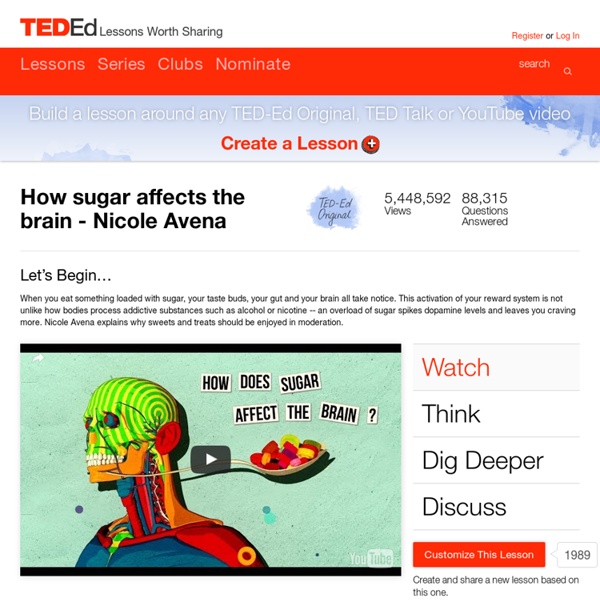



http://ed.ted.com/lessons/how-sugar-affects-the-brain-nicole-avena
Related: Brain researchWhy Students Forget—and What You Can Do About It Teachers have long known that rote memorization can lead to a superficial grasp of material that is quickly forgotten. But new research in the field of neuroscience is starting to shed light on the ways that brains are wired to forget—highlighting the importance of strategies to retain knowledge and make learning stick. In a recent article published in the journal Neuron, neurobiologists Blake Richards and Paul Frankland challenge the predominant view of memory, which holds that forgetting is a process of loss—the gradual washing away of critical information despite our best efforts to retain it.
25 maps that explain the English language English is the language of Shakespeare and the language of Chaucer. It’s spoken in dozens of countries around the world, from the United States to a tiny island named Tristan da Cunha. It reflects the influences of centuries of international exchange, including conquest and colonization, from the Vikings through the 21st century. Here are 25 maps and charts that explain how English got started and evolved into the differently accented languages spoken today. The origins of English 1) Where English comes from
Trauma Training for Educators – Communities In Schools Of Central Texas Click the red “PLAY” icon below to view the training video. Scroll down for facilitator resources and information about the training. Be sure to read the important notice below for best accessibility of the video. See facilitator resources below ‘The Breakfast Club’: 8 Quotes For When You Need To Be Yourself Universal Pictures “Just be yourself” is a fairly common message in the teen film genre, but few have navigated the universal feelings as well as The Breakfast Club. While the question over which John Hughes film is the best is frequently pondered, the tale of the brain, the athlete, the criminal, the princess, and the basket case is almost always at the top of the list.
edutopia Teaching students basic knowledge about the brain’s potential can have a positive impact on their motivation, grit, and achievement. In particular, explicitly teaching them that learning changes the structure and function of their brains can be transformational in building a stronger belief in the value of working hard to master new material. Teachers who explain these findings report that the knowledge has a positive effect on students’ perceptions of their abilities as well as on their expectations for success. Examples From Elementary Classrooms Irregular Verbs? Yes,Please! My son Lucas was complaining he was going to have a permanent crick in his neck from spending hourrrrrs (or words to that effect) trying to learn irregular verbs in English when it occurred to me there might be plenty of sites on the Internet to help students, and my own son in this case, with this seemingly daunting task. And just as I predicted there are some cool sites that offer a nice alternative to the traditional pen-and-paper method of learning irregular verbs. Hard to believe me? Then, try these games and I bet you’ll be delighted next time you are asked to study them. Dear Lucas, this post is for you!!!
edutopia I lost my first student to suicide not long ago. The student was no longer in my class at the time, nor even at the school, but I was flooded with the expected surge of feelings: overwhelming sadness, periodic despair, compulsive frame-by-frame replays of our every interaction. I felt the loss deeply. It was unspeakably tragic—for the student’s friends and family, for me, and for the world I’d hoped the student would help shape. SEQUENCE 1 - Mrs Dubuisson Wild Wild West A million ways to die in the west Trailer - English Trailer - English...with subtitles in French! What Are the Brain Benefits of Unplugging for Students and Teachers? Our kids are spending eight hours on electronics every single day. Some say this number is conservative once you add all the time they spend in front of computers and tablets at school. While there’s no doubt technology is a wonderful tool for education, more reports, studies, and experts are saying we’ve gone too far. In fact, our always-stimulated brains are leading experts to use dramatic terms like digital heroin.